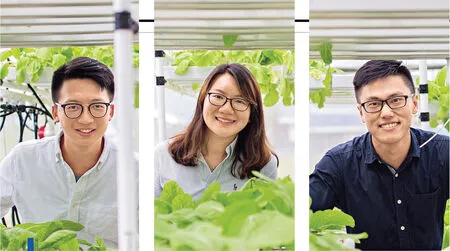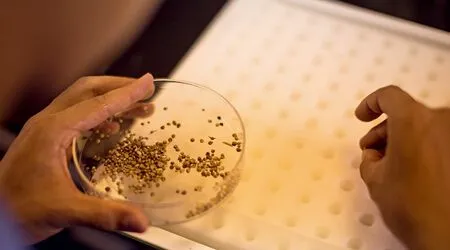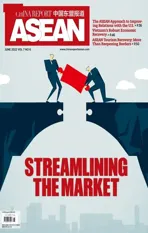HONG KONG GRADUATES FARMING THE GREATER BAY AREA
2022-06-23ByChenKe
By Chen Ke
“Every city in the Greater Bay Area has a different way to help us realize our dreams.”

Left to right:Fung Leung,Mandy Tam,and Voctor Lo.
In Chikan Town of Jiangmen City,south China’s Guangdong Province,Fung Leung from Hong Kong is securely dressed for a day in a paddy field by rolling his trouser legs over his rain boots.The only thing that distinguished him from local villagers is a pair of blackframed glasses and a Hong Kong accent on his Mandarin.A spring breeze wafts across the 20-hectare paddy field,leaving behind a green wave.After the rice is harvested,vegetables will be planted in the field.In concert with another 13-hectare plot,a vegetable production base the size of two Shenzhen Airports is in the works.Upon completion,Leung’s vegetable base,characterized by a“fish-vegetable symbiosis system,”will expand to a capacity of 8,000 tons annually of vegetables bound for Hong Kong and Macao.
Leung partnered with two fellow university graduates,Voctor Lo and Mandy Tam,on the project.All three were born in the 1990s and respectively graduated from Hong Kong Polytechnic University,the Chinese University of Hong Kong,and the Hong Kong Shu Yan University.Although none majored in agriculture,six years ago,they committed to Jiangmen as the location for their career development.Since then,they have become professional farmers and realized their dreams step by step.
Entrepreneurial Partners
“Symbiosis of fish and vegetable”is an agricultural technology to transform the nutrient-rich water produced by intensive fish farming into nutrients that vegetables absorb through a water treatment system,which can boost the growth of vegetables.
Leung was a sophomore when he was first introduced to the cutting-edge technology for modern agricultural production.
“I first started farming vegetables on a rooftop as a social project in college,”said Leung.“The vegetables I grew looked strange and ugly.So I asked Lo and Tam for help.They were both my high school classmates.With their assistance,the rooftop farm started looking nicer which made the project more interesting.”
“If ‘symbiosis of fish and vegetable’is applied to mass production of vegetables,it would be tremendously beneficial in many ways,”said Leung.“We are experimenting on ways to apply this to mass production.”They were ambitious,but the rooftop farm was too small to meet their needs.Their instructor suggested they find a better location to continue the experiment.An attempt to expand their farm in Hong Kong,a metropolitan with limited space,failed,which prevented further experiments.
“Later,we began to look for opportunities on the mainland,”said Leung.“We picked Guangdong Province because it is geographically and culturally close to Hong Kong but has more space and more opportunities.”They translated their ideas into plans and made contact with agriculture and human resources authorities in cities of Shenzhen,Zhongshan,Huizhou,Foshan,and Jiangmen.Leung’s mother was not optimistic.“Why would they want to help you with your project?”she asked.
“To our surprise,Zhongshan and Jiangmen sounded excited about it,”Leung recalled,unable to believe it himself.
“Jiangmen provided a 200-squaremeter vacant greenhouse for free along with a spacious dormitory,”he added.
Jiangmen is a major agricultural city in Guangdong and the largest“vegetable basket”in the Pearl River Delta region.The greenhouse is located in Cangcheng Town,55 kilometers from the city center.It is within the perimeter of Jiangmen National Agricultural Science and Technology Park,the largest park of its kind in the city.The young students considered it an optimal location.After graduation,they went to the park to start a business.
Without any support from Hong Kong investors,their start-up fund was a mere 10,000 yuan (US$1,540) of money gifted by their parents and relatives during the Chinese New Year holidays.“In July 2016,we were lucky to receive financial support of 50,000 yuan (US$7,690)from the local ‘mayor’s fund,’ which helped us purchase more equipment and supplies and update the water treatment system,”Leung reported.Since then,each of the trio has played an essential role in realizing their dreams:Leung designed and operates the water treatment system,Lo grows vegetables,and Tam raises fish and carries out microbiological research.
“None of us had ever previously raised fish or planted vegetables,”said Leung,“We started everything from scratch with experiments.When our project was listed as a project with government support for rural and agricultural development,the Park sent two technicians to help us.”
During that period,Leung traveled back to Hong Kong once every two months.“When I got back from Hong Kong,I would immediately head to work in the mountains,”he said.He still fondly recalls first arriving at the greenhouse in Cangcheng in July after graduating from university.The average temperature in the greenhouse was 36-37 degrees Celsius (96-98F).“We undressed almost immediately,”he grinned.“At first,we wore swimwear so that we did not have to do laundry.However,soon enough,we got sunburned and started wearing clothes to cover our skin.”

Aerial view of Jiangmen National Agricultural Science and Technology Park,Guangdong Province.(VCG)

Fung Leung plants vegetable seeds in a sponge on June 22,2017.(VCG)
Upgrading with Experience
Soon after their water treatment system went operational,the first crop of vegetables was harvested.However,Leung and his team didn’t like the white and yellowish colors on vegetables that were supposed to be green.The local technicians suggested that it was a lack of iron and potassium in their water treatment system,essential minerals to grow green vegetables.“We learned that there are two kinds of additives:chemical and natural,”said Leung.“If we chose the chemical additive,the fish in the pond would be killed,and the vegetables would not meet the standards of organic products.”
They began to conduct more experiments.They tried a number of things,including swine feces and fish guts,to no avail.Eventually,they found a good solution:After fermentation,peanut bran became a nice natural additive.Across three years of research and development,the entrepreneurial team collected more than 3,300 sets of water quality data and completed some 2,600 experiments in vegetable cultivation.
Leung clearly remembers the day in late August 2017 that Super Typhoon Hato hit the Pearl River Delta region just as the first stage of experiment was closing on success.Their greenhouse was leveled on the eve of harvest.Leung and his partners looked at each other speechless for a long time before Leung broke the silence:“Does this mean we have to go back to Hong Kong?”They did return to Hong Kong for a week to regroup.
Soon,the Park authorities noticed their difficult situation.After the typhoon,the Park offered the entrepreneurial trio two 200-square-meter smart glass greenhouses.Leung regained his confidence,and agreed with his partners that since they were starting over,they should apply their accumulated experience to improve the fishvegetable symbiosis system and make breakthroughs.“The typhoon prompted us to upgrade the system while solving the existing problems,”said Leung.“Since then,our business has been doing much better.”Their new system was completed the same day as the Hong Kong-Zhuhai-Macao Bridge,which they considered a meaningful coincidence.
“We have benefited a lot from the development of infrastructure:It’s easier for us to travel back home,and the logistical costs for our production have dropped steeply.”
After experimenting with more than 200 varieties of vegetables,the base now raises a dozen varieties of vegetables including lettuce,cabbage,mustard greens,and other green vegetables.In 2019,its annual vegetable production capacity reached 500 tons.
Leung was quite impressed by his first experience selling his products in the market.Although local housewives were happy with their“sample”vegetables,they were still not sure whether any locals would pay a premium for them.So the team decided to try their fortune in a suburban wholesale market.
“The market opened at 11 a.m.,”recalled Leung.“Buyers swarmed our truck as soon as the doors opened.”Leung assumed that their products were popular simply because they looked clean,white and plump,with very few imperfections.“Although our products were 20 to 30 percent more expensive than their counterparts in the market,they were competitive as organic and eco-friendly.”
Leung and his partners don’t have to go back to the wholesale market anymore because buyers now come to the base.Some of their products are transported to Hong Kong directly.In the past,when production capacity was limited,they shipped about a ton of vegetables to Hong Kong every week together with goods from other suppliers.“With production capacity expanded this year,we now send truckloads of our products to Hong Kong,”he said.
Their registered business has obtained certification as a“vegetable production base for Hong Kong and Macao”and“vegetable basket production base for the Guangdong-Hong Kong-Macao Greater Bay Area.”Leung often pictures his relatives and friends in Hong Kong picking up fresh vegetables in their local market that he personally cultivated.“That gives me a sense of achievement,”he said.
Beneficiaries of the Greater Bay Area
It’s an hour by car from Leung’s base in Cangcheng to Chikan.With support from the local government and villagers’ committee,Leung’s team subcontracted the management rights to a 33-hectare plot with intent to make it their main vegetable production base.
Over the last two months,the team has worked with local villagers to prepare 20 hectares of the plot to cultivate high-quality rice.
“You shouldn’t just launch right into planting vegetables across the whole plot,”explained Leung.“We’re also digging a four-hectare fish pond in Chikan.The water in the pond will be treated with our system to irrigate vegetables similarly to what we did in the Cangcheng base.”In the middle of the new base is a two-story house built by local villagers with a beautiful view from the second-floor balcony.They rented the house to use the first floor as a meeting room,office,and lab,and the second floor as dormitories.
When they first arrived in Jiangmen,construction of the Greater Bay Area was not yet in full swing at the national level.“We were not aware of the project until we began to feel the power of its presence,”said Leung.It used to take them three to four hours to travel back to Hong Kong because they had to cross the Humen Bridge which was frequently jammed.“Things are much easier now with more options such as high-speed trains,the Hong Kong-Zhuhai-Macao Bridge,and the Nansha Bridge.We have benefited a lot from the development of infrastructure:It’s easier for us to travel back home,and the logistical costs for our production have dropped steeply.”
Leung also had some new experiences.He had previously visited big cities in the mainland,but had no idea what the suburban area of Jiangmen would be like.Upon arrival,he found it quite developed in a number of impressive industries.“It is the world’s No.1 producer of corn poppers,”gasped Leung.“Without knowing anything about the host city,we were welcomed to settle there and given a platform for our career development.”The trio is working to give back to their generous hosts.Alongside becoming local taxpayers,they won a gold medal for Guangdong Province in the national young innovators and entrepreneurs competition at the end of 2019.
Leung has also enjoyed getting to know the local villagers.Everyone in town knows the trio by now,and they are frequently teased about their tanned skin.Leung has not been back to Hong Kong since the outbreak of COVID-19 more than two years ago.During the Spring Festival of 2022,he and Lo visited a neighbor in the village to extend festive greetings.“We also enjoyed a good meal,”he said with a laugh.
Today,the three young entrepreneurs have even bigger dreams for the future:In five to 10 years,they want to call both Hong Kong and Jiangmen home,with their production base in Jiangmen and their R&D base in Shenzhen.
“Each city in the Greater Bay Area has unique features that can help us realize our dreams,”said Leung.“If other young people in Hong Kong are interested in farming on the mainland,I would be happy to guide them.”
